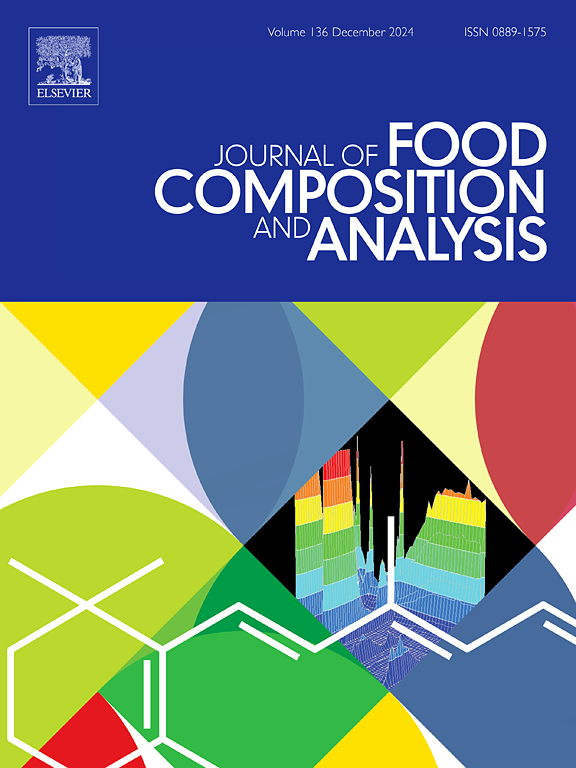中国电子商务平台罗非鱼产品硒摄入通量概况及膳食健康评估
IF 4
2区 农林科学
Q2 CHEMISTRY, APPLIED
引用次数: 0
摘要
众所周知,罗非鱼是获取硒的重要途径,对人类具有很高的营养价值。然而,目前还没有关于罗非鱼硒摄入通量概况和膳食健康评估的具体分析。此外,对消费者来说,获得不同种类罗非鱼中硒含量的相关评估也很重要。这将使不同年龄段的人群有条不紊地规划其膳食摄入量。我们统计了中国罗非鱼的进出口总量。此外,我们还在此基础上建立了基于生产模式的硒含量分布模型。研究还深入探讨了硒含量在中国国内的分布模式(n=147)。广东作为罗非鱼的产地,是消费者最大的电子商务渠道。冷冻罗非鱼、腌制罗非鱼和罗非鱼罐头的硒含量中位数分别为 0.233 毫克/千克、0.239 毫克/千克和 1.073 毫克/千克。由此可见,全球成年人应控制罐头罗非鱼的食用量,以避免硒中毒。此外,仅靠食用罗非鱼不足以满足婴儿对硒的需求。这些发现强调了罗非鱼在膳食中的营养价值。此外,这些见解有助于全面评估膳食选择对健康的影响,从而为全球各年龄段人群制定有针对性的建议。本文章由计算机程序翻译,如有差异,请以英文原文为准。
Flux profile of selenium intake and dietary health assessment of tilapia products in China e-commerce platform
Tilapia is known as an important way to obtain selenium and has high nutritional values for humans. However, there is currently no specific analysis of the flux profile of selenium intake and dietary health evaluation in tilapia. In addition, it is important for consumers to obtain relevant assessments of the selenium content in different species of tilapia. This will enable different age groups to plan their dietary intake in an organized manner accordingly. We counted the total import and export volume of tilapia in China. Furthermore, we modeled the distribution of selenium content based on the production mode on this basis. The study also delved into the distribution pattern of selenium content within China (n=147). Guangdong, as the production place of tilapia, is the largest e-commerce channel for consumers. The median selenium measured in frozen tilapia, pickled tilapia and canned tilapia was 0.233 mg/kg, 0.239 mg/kg and 1.073 mg/kg respectively. It is evident that adults globally should regulate their consumption of canned tilapia to avoid selenium toxicity. Furthermore, relying solely on tilapia consumption is insufficient to meet the selenium needs of infants. The findings underscore the nutritional value of tilapia in diets. Additionally, these insights can facilitate a comprehensive assessment of the health implications associated with dietary choices, enabling the formulation of targeted advice for various age groups worldwide.
求助全文
通过发布文献求助,成功后即可免费获取论文全文。
去求助
来源期刊

Journal of Food Composition and Analysis
工程技术-食品科技
CiteScore
6.20
自引率
11.60%
发文量
601
审稿时长
53 days
期刊介绍:
The Journal of Food Composition and Analysis publishes manuscripts on scientific aspects of data on the chemical composition of human foods, with particular emphasis on actual data on composition of foods; analytical methods; studies on the manipulation, storage, distribution and use of food composition data; and studies on the statistics, use and distribution of such data and data systems. The Journal''s basis is nutrient composition, with increasing emphasis on bioactive non-nutrient and anti-nutrient components. Papers must provide sufficient description of the food samples, analytical methods, quality control procedures and statistical treatments of the data to permit the end users of the food composition data to evaluate the appropriateness of such data in their projects.
The Journal does not publish papers on: microbiological compounds; sensory quality; aromatics/volatiles in food and wine; essential oils; organoleptic characteristics of food; physical properties; or clinical papers and pharmacology-related papers.
 求助内容:
求助内容: 应助结果提醒方式:
应助结果提醒方式:


